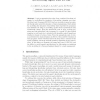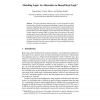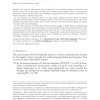529 search results - page 29 / 106 » Simple Random Logic Programs |
AGP
2003
IEEE
15 years 7 months ago
2003
IEEE
Abstract. Logic programming has often been considered less than adequate for modelling the dynamics of knowledge changing over time. Evolving Logic Programs (EVOLP) has been recent...
130
click to vote
ICML
2008
IEEE
16 years 2 months ago
2008
IEEE
In inductive logic programming, subsumption is a widely used coverage test. Unfortunately, testing -subsumption is NP-complete, which represents a crucial efficiency bottleneck fo...
155
click to vote
AMAST
2010
Springer
14 years 9 months ago
2010
Springer
Abstract. This paper introduces matching logic, a novel framework for defining axiomatic semantics for programming languages, inspired from operational semantics. Matching logic sp...
122
click to vote
STOC
1999
ACM
15 years 6 months ago
1999
ACM
The width of a Resolution proof is defined to be the maximal number of literals in any clause of the proof. In this paper, we relate proof width to proof length (ϭsize), in both g...
121
click to vote
KR
2004
Springer
15 years 7 months ago
2004
Springer
Disjunction is generally considered to add expressive power to logic programs under the stable model semantics, which have become a popular programming paradigm for knowledge repr...



